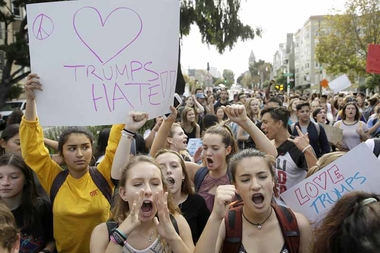Trump drives teens to demonstrate though they can't vote

A high school senior, Yaocihuatl Reyes didn't pay much attention to the presidential race until she found her teacher sobbing and her east Los Angeles classmates terrified that the election of Donald Trump would lead to the deportation of their families.
At that moment, the 17-year-old daughter of a nurse and security guard with little political upbringing said she felt driven to act.
She and a friend asked students from nearby high schools in the predominantly Latino neighborhood to meet at a park, where they decided to lead a walkout. They made signs, wrote chants and mapped routes for the march to City Hall days later. Hundreds took part.
"We just wanted to go and tell our community that we're here for them, we're scared, too, but we're not going to give up," said Reyes, whose family is in the U.S. legally. "This walkout was kind of for unity, to unify each other."
Though too young to vote, thousands of high school students from Seattle to Silver Spring, Maryland, have taken to the streets since Trump's election to protest his proposed crackdown on illegal immigration and his rude comments about women.
It is an unusual show of political involvement on the part of young people. And experts say that kind of engagement can lead to increased activism when they are adults.
"The election has really promoted a feeling on the part of many people that just staying silent is being complicit, and so we're seeing a huge uptick in engagement," said Jennifer Earl, a professor of sociology at the University of Arizona who researches the internet and social movements.
On the other side of the political divide, students have also rallied in support of Trump, though in smaller numbers.
The so-called millennial generation — the youngest adult generation — is the most racially and ethnically diverse in the country now, according to the Washington-based Pew Research Center. Nearly half of millennials identify themselves as political independents, more than in prior generations, according to Pew.
Young people who are politically active and concerned about issues are more likely to vote once they turn 18, said Joseph Kahne, professor of educational policy and politics at the University of California, Riverside.
Many teens are using social media to spread the word about demonstrations. The best predictor of whether a young person attends a protest is whether he or she is asked to go, Kahne said.
Reyes said she had never even attended a political event until earlier this year, when she asked her mother to take her to a rally for Democratic Sen. Bernie Sanders.
Oregon teen Cole Sandlin said he, too, had never attended a political rally before organizing one at his high school. He and a friend ordered flags online to support Trump, affixed them to their trucks and gathered in the parking lot before class on Election Day. The rally drew about 30 students.
"We thought, this is basically our first election that we're involved in, that we ought to do something to show our political views," said Sandlin, who turned 18 shortly after the election and likes Trump's promises to revamp health care and trade.
Sandlin said he has long been interested in politics and grew up watching the news with his father, a farmer in Silverton, Oregon. He said he plans to work on the farm after graduation but will keep up on political issues.
"If there was something I felt compelled to share my opinion, I wouldn't have a problem doing that," he said.
Nor would Reyes, who plans to attend college next year and major in political science, inspired by Sanders' campaign. She said also wants to organize a community rally in east Los Angeles with speakers on topics such as criminal justice reform.
"It was kind of bizarre. I didn't think people would come," she said of the walkout. "I just kept telling my friends, 'Wow, we actually did this. People actually came. It worked.'"
By AMY TAXIN, Associated Press
Copyright Associated Press. All rights reserved.
The Gayly - 11/21/2016 @ 12:59 p.m. CST.





